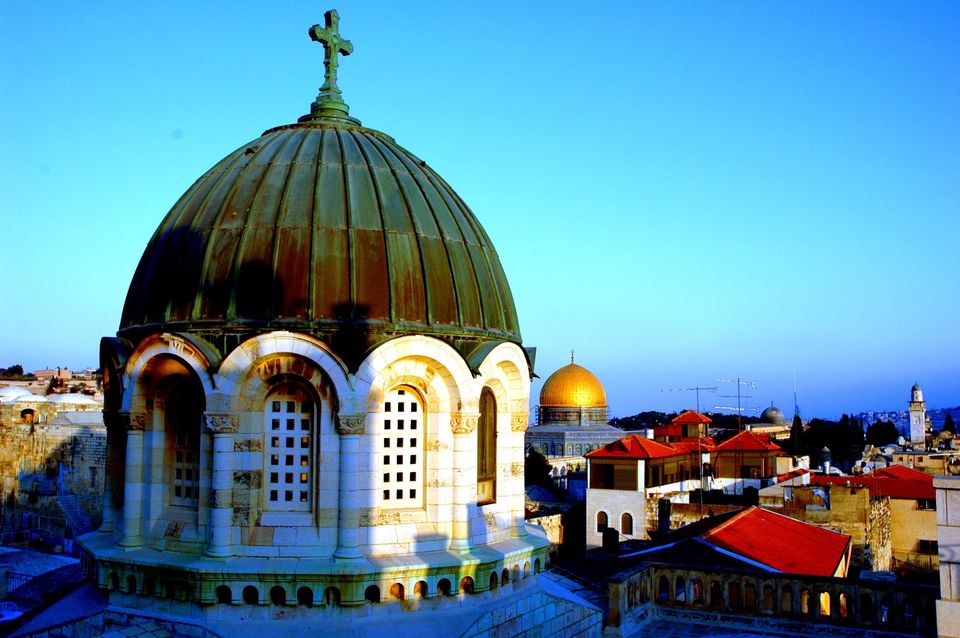The Church of Living Stones in Palestine–Israel
My name is Graham Joseph Hill, and I’m the State Leader for Baptist Mission Australia (Western Australia). I’m a Committee Member of the Palestine Israel Ecumenical Network. As the Founding Director of The Global Church Project, I’ve had many opportunities to visit the Palestinian Territories, Jordan, and Israel and to do filmed interviews with Palestinian Christian leaders and theologians (and others in the region, including Christian, Jewish, and Muslim religious leaders and peacemaker activists). These include Ali Abu Awwad, Amal Nassar, Areej Masoud, Charlie Abou Saada, Elias Chacour, Jack Sara, Mitri Raheb, Munib Younan, Sami Awad, Shaul Judelman, and more. See all these filmed interviews.
I want to share some lessons I’ve learnt by referring to the writing and insights of Mitri Raheb. Palestinian Christianity traces its roots to the early church, which was, of course, in Palestine. Palestinian Christian faith developed in the context of occupation and empire. The peoples of Palestine have lived under occupation for thousands of years.
Mitri Raheb says that Christian faith challenges empire. Faith offers hope for a change in the status quo. 1 Jesus did not go to Rome; the heart of empire and the seat of political power. Jesus did not create a political party; even though his popularity would have allowed it. Jesus did not seek status as a religious leader or patriarch. So, what was Jesus’s approach to faith in the face of empire? Mitri Raheb shows how Jesus did things that were totally unpredictable. Yet his behavior and message confronted the empire. He spoke of a different way. He modelled and revealed an alternative kingdom. Jesus disrupted, subverted, and overcame the principalities and powers. He went where politicians and ambitious religious leaders never went: among the poor, marginalized, distained, and forgotten. Jesus spent his time in remote villages far from the seat of power. He loved (and spent most of his time among) the oppressed, marginalized, occupied, downtrodden, bruised, sinful, and broken people. Jesus showed that the kingdom of God is different than empire. The kingdom of God dwells among those on the margins and fringes of political, social, religious, and cultural structures. And it’s at the margins that God challenges the power and future of empires, and reveals the kingdom of God. Mitri Raheb says the Palestinian church can speak out for equality for all minorities and for women.
Just as Jesus went among the poor, marginalized, distained, and forgotten, and proclaimed that the kingdom of God was being revealed among these little ones, so too might the Palestinian church show that God is challenging empire from the fringes and margins of society. Jesus challenges empire from
the margins—so should the church. And Raheb says that women pay a heavy price under occupation.
They suffer from political conflict, broken families, the death of loved ones, and religious and political repression. Raheb says the Palestinian church should follow the way of Jesus in honoring women. Finally, Raheb says that God is calling the Palestinian church, and the church worldwide, to “faith in action in the face of empire.” Such faith in action means being a peacemaking, just, reconciling, liberating, and prophetic people. 2
Many Palestinian Christians firmly believe that they are called to the region of Palestine “to be a witness for an open, active, and dynamic community in the birthplace of Christianity.” Mitri Raheb says, “I believe that we, as Christians in Palestine, are not spectators but actors in our history. We cannot, as living stones, choose but to engage ourselves, get our hands dirty, and become involved… At a time when despair and hopelessness are growing, our role as Palestinian Christians can be best summed up in the words of Martin Luther, “Even if I knew that the world is coming to an end tomorrow, today I would go out to my garden and plant an apple tree.” Or as we say in Palestine, in a more contextual way, “Plant an olive tree.” Because only then will our children, after tomorrow, have shade to play under, have olive oil to eat, olive oil with which to heal their wounds, and olive branches to wave as a sign for the peace to come.” 3
May God grace us with the wisdom and courage to challenge empires and powers, and speak the truth in faith, hope, and love. May we do justice, love mercy, and walk humble with our God, while being taught by the peoples of Palestine what it means to imitate our Lord Jesus Christ’s suffering,
1 Mitri Raheb, Faith in the Face of Empire: The Bible Through Palestinian Eyes (Maryknoll, NY: Orbis Books, 2014). 5.
2 Raheb, Faith. 130. See pages 93–130.
3 Mitri Raheb, Sailing through troubled waters: Palestinian Christians in the Holy Land,” Dialog 41, no. 2 (Summer 2002). 102. reconciliation, peacemaking, and hope.
Yours in grace, justice, and peace
Rev Dr Graham Joseph Hill
(This article is a modified excerpt from my book Salt, Light, and a City, Second Edition: Conformation–
Ecclesiology for the Global Missional Community: Volume 2, Majority World Voices).
Bibliography
Raheb, Mitri. Faith in the Face of Empire: The Bible through Palestinian Eyes. Maryknoll, NY: Orbis
Books, 2014.
Sailing through Troubled Waters: Palestinian Christians in the Holy Land.” Dialog 41, no. 2
(Summer 2002): 97–102.

